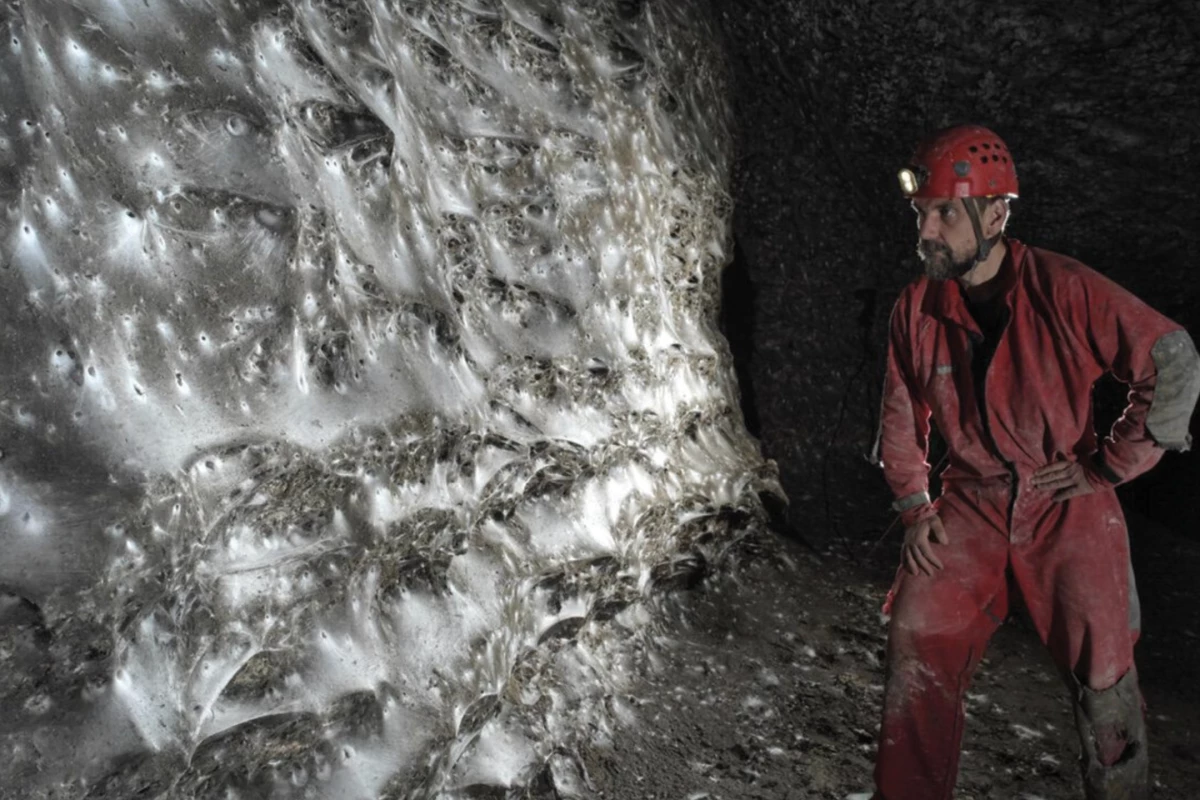Science
Scientists Discover Massive Spider Colony in Sulfur Cave

Deep within the Sulfur Cave, located on the border of Albania and Greece, scientists have uncovered a remarkable phenomenon: a giant spider web encompassing more than 100 square meters (over 1,000 sq ft) and hosting approximately 110,000 spiders. This extraordinary discovery was made by a team from the Czech Speleological Society during a wildlife survey conducted in 2022. The web is not just a marvel in size but also in composition, featuring around 69,000 Tegenaria domestica and 42,000 Prinerigone vagans spiders coexisting in an unprecedented communal living arrangement.
The Sulfur Cave is unique due to its chemoautotrophic ecosystem, where life is sustained not by sunlight but through the process of chemosynthesis. In this dark environment, sulfur-oxidizing bacteria thrive on wet rock and sediment, forming thick white biofilms. These microorganisms serve as the base of the food chain, consumed by small invertebrates like midge larvae and isopods, which are then preyed upon by larger insects, including the spiders.
Researchers were surprised to observe that the common house spider, typically a solitary hunter, has adapted to form a multilayered web in this cave, merging its funnel webs into a vast structure draped across the cave walls. The researchers noted the absence of the usual cannibalistic behavior typically exhibited by T. domestica, leading to greater speculation about the factors that allow such a large number of spiders to thrive together.
The ecosystem in the Sulfur Cave provides an abundance of food. Close to the warm stream that runs through the cave, the air is dense with Tanytarsus albisutus midges, with a density of about 45,000 per square meter (approximately 4,180 per sq ft). The spiders benefit from this high food availability, eradicating typical competition for resources.
Further analysis of the spider populations revealed unique genetic traits not found in their above-ground counterparts. There was a notable difference in reproductive behavior; the cave-dwelling T. domestica laid significantly fewer eggs than those in typical environments. Researchers propose that this may be a response to the cave’s low-oxygen conditions and the lack of natural predators, allowing the spiders to maintain a stable population without the need for increased reproduction.
The findings, published in the journal Subterranean Biology, highlight a fascinating case of communal living in an extreme environment. According to the researchers, this discovery sheds light on how species can adapt their behavior and biology in response to their surroundings.
In a broader context, the research reflects on how life can flourish in challenging environments. Similar adaptations have been observed in other organisms, such as microbes residing on cheese, indicating the rapidity with which life can evolve when faced with new conditions.
While Sulfur Cave may not become a popular tourist destination due to its pungent odor and the sheer number of spiders, the insights gained from this study are invaluable to the field of entomology and our understanding of ecological interactions in isolated habitats.
-

 Technology4 months ago
Technology4 months agoDiscover the Top 10 Calorie Counting Apps of 2025
-

 Health2 months ago
Health2 months agoBella Hadid Shares Health Update After Treatment for Lyme Disease
-

 Health3 months ago
Health3 months agoErin Bates Shares Recovery Update Following Sepsis Complications
-

 Technology4 weeks ago
Technology4 weeks agoDiscover 2025’s Top GPUs for Exceptional 4K Gaming Performance
-

 Technology2 months ago
Technology2 months agoElectric Moto Influencer Surronster Arrested in Tijuana
-

 Technology4 months ago
Technology4 months agoDiscover How to Reverse Image Search Using ChatGPT Effortlessly
-

 Technology4 months ago
Technology4 months agoMeta Initiates $60B AI Data Center Expansion, Starting in Ohio
-

 Technology4 months ago
Technology4 months agoRecovering a Suspended TikTok Account: A Step-by-Step Guide
-

 Health4 months ago
Health4 months agoTested: Rab Firewall Mountain Jacket Survives Harsh Conditions
-

 Lifestyle4 months ago
Lifestyle4 months agoBelton Family Reunites After Daughter Survives Hill Country Floods
-

 Technology3 months ago
Technology3 months agoUncovering the Top Five Most Challenging Motorcycles to Ride
-

 Technology4 months ago
Technology4 months agoHarmonic Launches AI Chatbot App to Transform Mathematical Reasoning




















